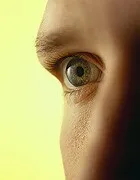Findings shed light on how people with macular degeneration might learn to adapt more quickly
WebMD News from HealthDay

By Robert Preidt
HealthDay Reporter
THURSDAY, Aug. 15 (HealthDay News) -- The system that controls eye movements in humans is highly adaptable and can make changes within a few hours when something interferes with a person's ability to see, according to a new study.
The researchers said their findings may suggest new ways to help people with age-related macular degeneration better cope with vision loss. The disease causes progressive loss of so-called "foveal" vision, leading to visual impairment and blindness.
The fovea is the small, central area of the retina. People constantly move their eyes to aim the fovea at different parts of a scene in order to create a picture of their surroundings, explained the authors of the study published Aug. 15 in the journal Current Biology.
"The system that controls how the eyes move is far more malleable than the literature has suggested," Bosco Tjan, of the University of Southern California, said in a journal news release. "We showed that people with normal vision can quickly adjust to a temporary occlusion [blockage] of their foveal vision by adapting a consistent point in their peripheral vision as their new point of gaze."
Tjan and colleagues simulated the loss of foveal vision in six young adults with normal vision. The researchers did this by blocking part of a visual scene with a gray disc that followed the participants' eye gaze. The participants were then asked to do object-following and visual-search tasks.
Within three hours, the participants had adjusted their eye movements to cope with the challenge. They retained this ability for a few weeks and were able to use it whenever their foveal vision was blocked.
The rapid rate of adjustment in eye movement surprised the researchers. They noted that many people with macular degeneration adapt their point of gaze, but the process typically takes months. These findings suggest that practice with a visible gray disc such as the one used in the study may help speed this adjustment.
source : Eye Study Results May Offer New Therapy for Some Vision Loss








